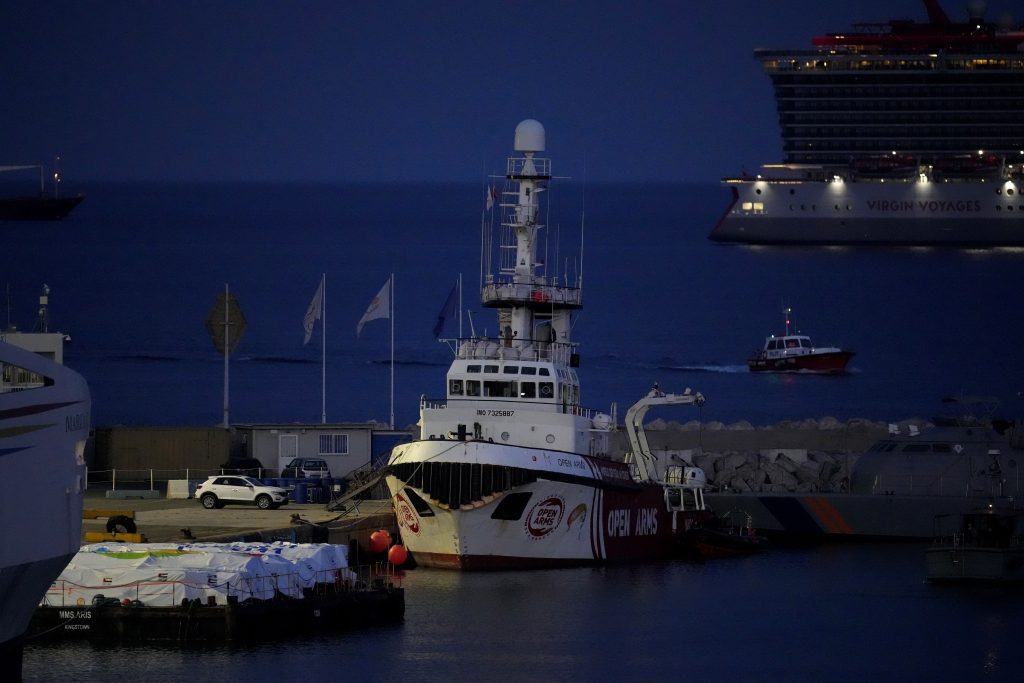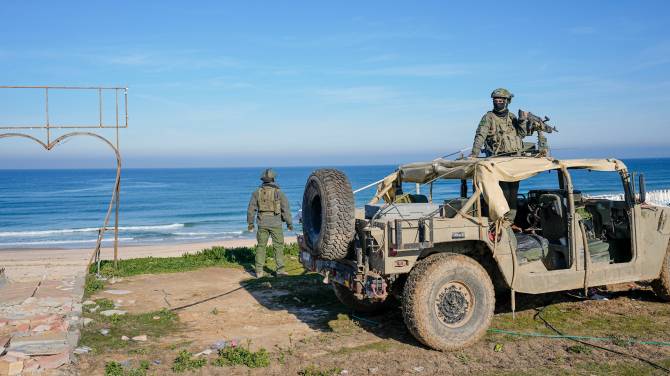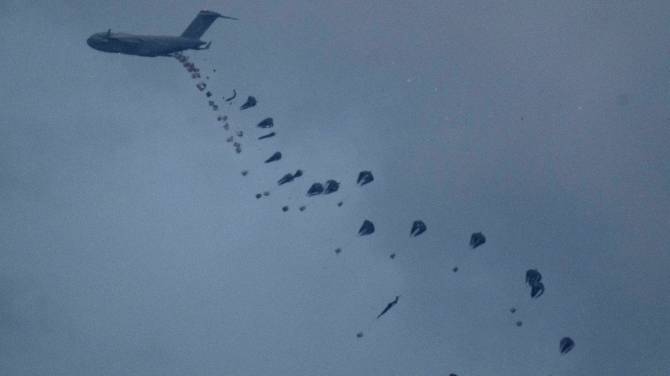A U.S. Army ship bringing materials to construct a temporary dock in Gaza was sailing towards the Mediterranean on Sunday, following an announcement by U.S. President Joe Biden about plans to increase aid shipments by sea to the blockaded area where many Palestinians are experiencing hunger.
The renewed effort to provide aid coincided with the start of the Muslim holy month of Ramadan in much of the world, as officials in Saudi Arabia spotted the crescent moon. Hopes for a new cease-fire by Ramadan faded days ago as negotiations appeared to be at a standstill.
Canadian Foreign Affairs Minister Mélanie Joly also affirmed Canada’s commitment to assisting in the delivery of aid to Gaza after meeting with the United Arab Emirates (UAE).
“Had a productive meeting with my counterpart in the UAE. We discussed the need to increase the amount of humanitarian aid reaching Gaza through all means possible. I committed that Canada will join the coalition to do just that through a humanitarian sea corridor,” said Joly in a post on X, formerly known as Twitter.
The establishment of the sea corridor, in addition to airdrops by the U.S., Jordan, and others, reflected increasing concern over Gaza’s deadly humanitarian crisis and a new willingness to bypass Israeli control over land shipments. However, aid officials emphasize that air and sea deliveries cannot fully compensate for the lack of land routes. The number of aid trucks entering Gaza each day is much lower than the 500 that were entering before the war.
A ship operated by Spanish aid organization Open Arms and transporting 200 tons of food aid was anticipated to make a trial trip to Gaza from nearby Cyprus “as soon as possible,” but not on Sunday, according to Linda Roth, a spokesperson for partner organization World Central Kitchen. No explanation was given after the president of Cyprus had stated that it would depart at that time.
Israel has expressed its approval of the sea deliveries and would inspect Gaza-bound cargo before it departs from Cyprus. Israeli Defense Minister Yoav Gallant observed preparatory work off Gaza’s coast on Sunday.
Biden has intensified public criticism of Israeli Prime Minister Benjamin Netanyahu, stating that he believes Netanyahu is “harming Israel more than helping it” in his approach to the Israel-Hamas conflict in Gaza, which is now in its sixth month.
Speaking on Saturday to MSNBC, the U.S. president expressed support for Israel’s right to pursue Hamas following the militants’ Oct. 7 attack on southern Israel. However, Biden mentioned that Netanyahu needs to pay more attention to the innocent lives being lost and added that “you cannot have 30,000 more Palestinians dead.”
The Health Ministry in Gaza reported that at least 31,045 Palestinians have been killed since the war began. The ministry does not distinguish between civilians and fighters in its count but states that women and children make up two-thirds of the deceased. The ministry is part of the Hamas-controlled government, and its numbers from previous conflicts have largely aligned with those of U.N. and independent experts.
Palestinian casualties continued to increase. The Civil Defense Department stated that 10 people were killed on Sunday in an Israeli airstrike on a house belonging to the Ashour family in the Tal al-Hawa area of Gaza City. Dust-covered bodies were placed onto blankets.
In another place, 15 people, including women and children, were taken to the main hospital in the central town of Deir al-Balah. An AP journalist reported that their relatives said they were killed by Israeli artillery fire at a tent camp for displaced Palestinians in the coastal area near the southern city of Khan Younis.
Israel rarely provides details about specific incidents during the war. It asserts that Hamas is to blame for civilian casualties because the militant group operates from within civilian areas.
Meanwhile, efforts by the U.S. began to establish a temporary pier in Gaza for sea deliveries. U.S. Central Command stated that the first U.S. Army vessel, the General Frank S. Besson, departed from a base in Virginia on Saturday and was heading to the Eastern Mediterranean with equipment for construction.
U.S. officials stated that it will probably take weeks before the pier is ready for use.
The sea corridor is supported by the European Union along with the United States, the United Arab Emirates, and other countries. The European Commission has mentioned that U.N. agencies and the Red Cross will have a role.
The ship in Cyprus is expected to take two to three days to reach an undisclosed location in Gaza. A spokesperson for the World Central Kitchen said that construction work started Sunday on the jetty for it.
A member of the charity said on X, previously Twitter, that once the ship’s barge arrives in Gaza, aid will be unloaded by a crane, placed on trucks, and driven to northern Gaza, which has been mostly isolated from aid shipments and was the primary target of Israel’s military offensive.
Israel initiated war on Oct. 7 after Hamas militants killed around 1,200 people, mostly civilians, and took 250 hostages. Israel’s air and ground offensive has severely damaged large areas of Gaza and forced about 80 percent of the 2.3 million population to leave their homes.
The U.S. and regional mediators Egypt and Qatar had aimed to have a six-week cease-fire in place by Ramadan. A deal would have involved Hamas releasing some Israeli hostages, Israel releasing some Palestinian prisoners, and aid groups gaining access for a major increase in aid.
In a speech broadcast on Sunday, Hamas’ top leader Ismail Haniyeh accused Israel of the failure to reach a deal before Ramadan and stated that the militant group is eager to resume negotiations within any framework as long as it ensures a permanent cease-fire.
–with files from Global News





